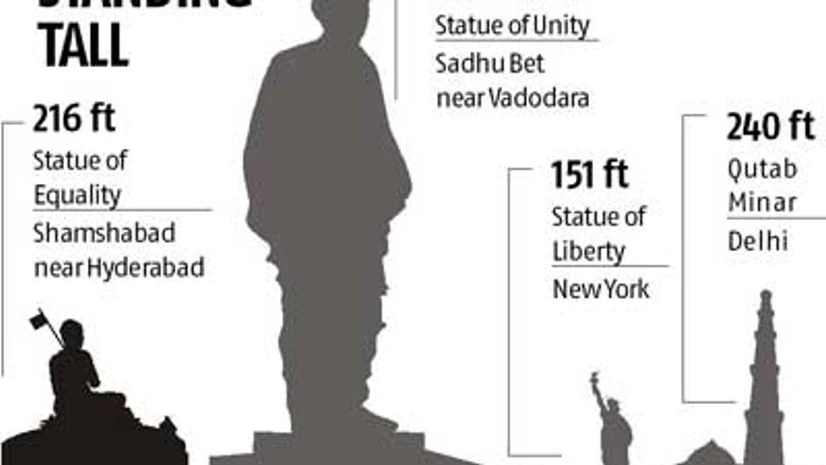After the "Statue of Unity", the 597-foot towering monument of Vallabhbhai Patel in Gujarat, comes the "Statue of Equality", a 216-foot-high metallic statue that will commemorate the 1,000th birth anniversary of philosopher-saint Sri Ramanuja.
Less than half the size of the Patel monument, the Ramanuja statue, however, literally has a tall claim to fame: it is planned as the world's largest sitting statue. The sculpture, which is coming up in the suburb of Shamshabad on the outskirts of Hyderabad, is expected to be taller than the Statue of Liberty in New York by 65 feet. The Statue of Liberty stands at 151 feet from the base to the torch. It will also be three-and-a half times higher than the famous 58-foot Buddha statue that stands in Hyderabad's Hussain Sagar Lake.
Poet-saint Ramanuja was an eminent acharya (teacher) and an expert in Vedic scriptures. He is said to have lived in the southern parts of India for 120 long years, from 1017 AD to 1137 AD. A community of Vaishnavites (Iyengar Brahmins) has been following his path of Vedanta, called Vishishtadwaita.
The ambitious project, spread over 45 acres, is expected to cost between Rs 800 crore and Rs 1,000 crore with the statue alone costing around Rs 130 crore. A Chinese company has been roped in to execute the project.
The architecture is inspired by the Sudarshana Chakra, a spinning, discus-like weapon that gods Vishnu and Krishna are often portrayed as holding.
The lotus on which the Ramanuja statue will rest will measure 27 feet in diametre. The dimensions are significant - they speak of the 24 tattvas, or principles of creation, with the 25th representing the soul, the 26th god and the 27th signifying the guru.
Also part of the project will be an Omnimax theatre, shaped like a planetarium, where incidents from Ramajuna's life will play out on a 180-degree screen. The parking area will be able to accommodate 1,500 vehicles.
At the entrance, a 10-minute show will explain the features of the project to visitors: its architecture, the amount of metal, steel and cement used, the cost of the project and so on. "People need to have an idea of what they are going to experience before they enter the place," says Jeeyar. Visitors can opt for headphones for a self-guided tour in different languages: Telugu, Tamil, Kannada, Hindi, Malayalam and English. Animatronics, or robotic presentation, will also be part of the tours.
Ramanuja was born as Ilaya Perumal at Sriperumpudur in the Kanchipuram district near Chennai. In his early days, he studied the Vedas and Vedanta under a teacher named Yadavaprakasha. So quick was he in learning the Vedas that the guru allegedly thought of eliminating him. The plan was to get rid of him in the Ganges, but Ramanuja learnt of it and fled from the place to be later rescued by a bird-hunting couple somewhere in north India. They helped him return to Kanchipuram in south India.
He got married and started teaching, but took sanyas when one day his wife ill-treated one of his students, Kanchipurna, and his wife for being from a lower caste. He later became the head of the mutt at Srirangam, a famous temple in Tamil Nadu, where he nominated 74 acharyas to succeed him. The statues of these 74 disciples of Ramanuja are also part of the project. But while Ramanuja's statue will be made of metal, all other structures will be in stone.
Ramanujacharya, says Jeeyar, believed that all were equal in the eyes of god and he fought for the equality of all - "not only for humans, but also for the birds, animals, trees and other creatures".

)
